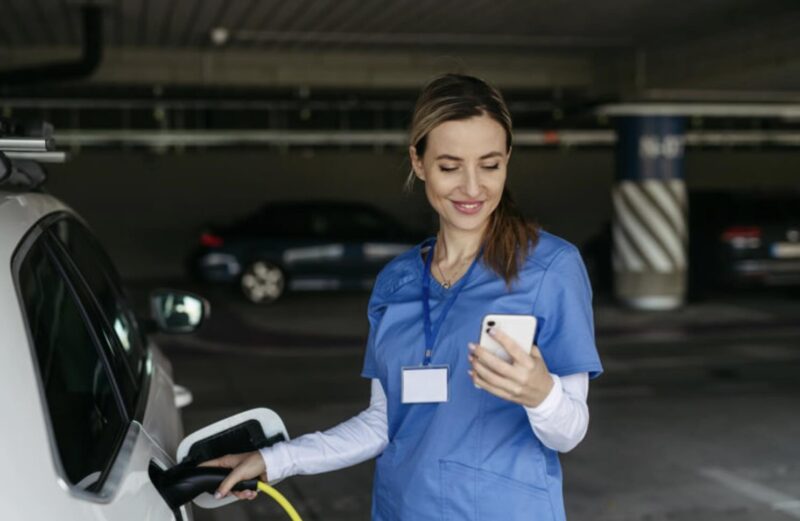The federal government has announced a new initiative to provide $150 million of loans to lower income households and frontline workers in a bid to make new electric cars more accessible.
The funding for the low-interest loans will come from the Clean Energy Finance Corporation via the Commonwealth Bank, and will be made available to Australians with an income below $100,000, or essential frontline workers – police, teachers, fire fighters, and health care, for instance – even with an income above $100,000.
The low interest loans – struck at a rate of 5.4 per cent – will be sized up to $55,000, according to the federal energy and climate minister Chris Bowen.
“We are seeing more and more cars available, electric cars available for less than $55,000,” Bowen told journalists at the announcement in western Sydney on Thursday.
“It used to be the case that … they weren’t available. But increasingly we’re seeing them come into the market, and we’re going to see even more with our new vehicle efficiency standards which come into force on the 1st of January providing Australians with more choice. It’s all about choices – choices for the planet, choices for the pocket.”
EV sales in Australia have grown slower than expected in 2024, despite a big increase in the number of models available, particularly at the lower end of the market courtesy – mostly – by new Chinese car makers.
Mostly, the low growth in EV sales is the result of a precipitous drop in the number of Tesla deliveries, which are down 20 per cent. Tesla previously accounted for more than half the EV market in Australia, and its slump in out down to a combination of new competition, stale offerings, and a dislike of CEO Elon Musk.
The CBA estimates the low interest loans will deliver savings of more than $8,000 in interest over seven years on a loan of $40,000 – which are applicable to the cars themselves and home charging infrastructure.
“The latest research shows that one in three Australians is considering buying an EV in the next five years, but price remains a key barrier,” said Ian Learmonth, the CEO of the CEFC. “Discounted finance can lower these barriers and increase access and availability to low emissions transport for more Australians.
“Our work with the CBA will reduce the upfront costs for EVs and expand low emissions vehicle ownership to more people who might have otherwise been locked out of the market.”
CBA General Manager Personal Lending Joel Larsen agreed that many Australians are open to buying an EV but are put off by the upfront cost. Our new EV Access Program is designed to provide customers with special offers on vehicles and a discounted interest rate for the life of the loan. With new cheaper models coming onto the market and a growing second-hand market, it’s a good time to consider an EV.
““To help customers get a good deal on an EV, CommBank has worked with some car manufacturers to develop a set of special offers which are available through the newly launched Buy and Own a Car service, accessible via the CommBank app,” Larsen said.
“Essential workers in cities like Melbourne and Sydney are more likely to commute by car and less likely to use public transport, compared to the general workforce, partly because of shift work that requires them to travel outside peak public transport schedules.
“Helping them purchase an EV improves transport accessibility for these workers and may reduce their carbon footprint.
The CEFC says it has helped finance more than 9,000 EVs worth more than $600 million, including through third party capital.
It has also invested more than $92 million in EV-related projects to further support the EV transition, including a $12.5 million investment into smart charging infrastructure and technology company, Jet Charge.

Giles Parkinson is founder and editor of The Driven, and also edits and founded the Renew Economy and One Step Off The Grid web sites. He has been a journalist for nearly 40 years, is a former business and deputy editor of the Australian Financial Review, and owns a Tesla Model 3.


